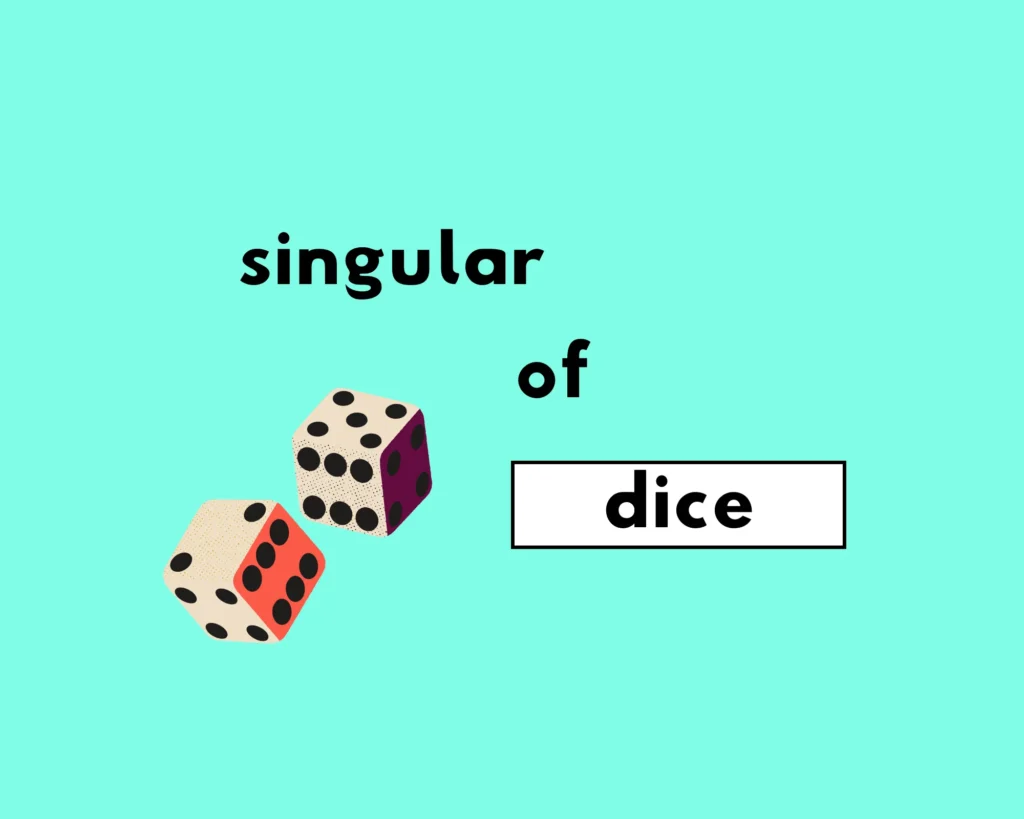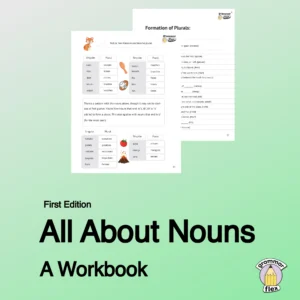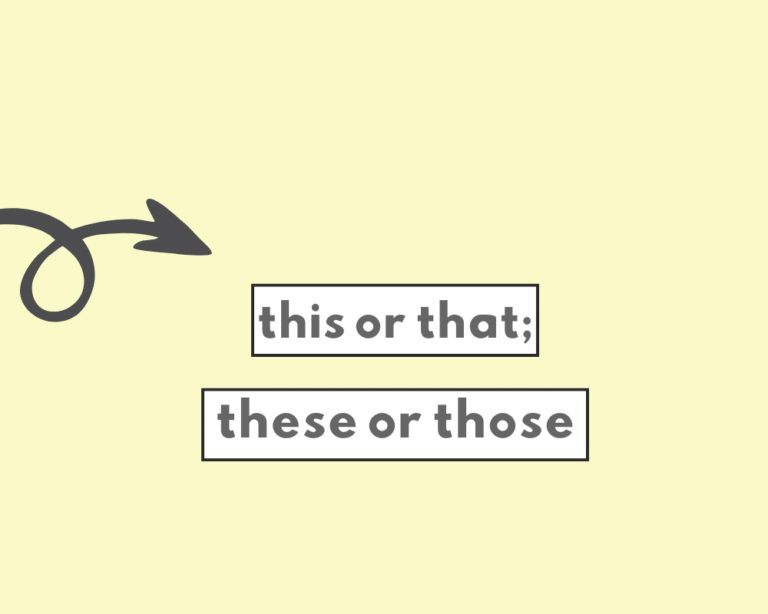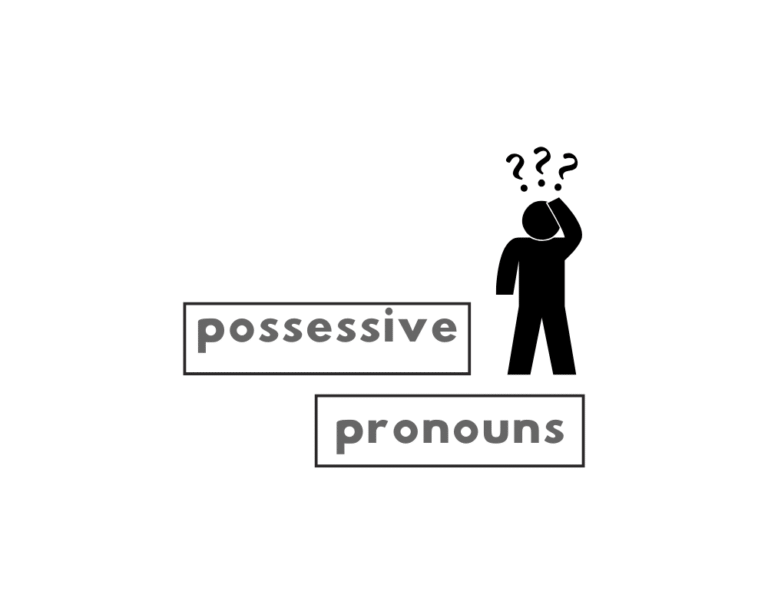What’s the plural of “dice”?
How do you refer to a single dice? The singular of ‘dice’ is ‘die’. Sounds strange? Well, that’s the formal way to refer to a single die, technically speaking.
The die is missing from the game box.
The dice are used for various board games.
Could you pass me several die from the cup? (Using the formal singular form ‘die’ incorrectly with a plural quantifier ‘several’)
The dice was scattered all over the floor.
What are dice?
Ever played Yahtzee? What about Monopoly? If those references didn’t help any: dice are those “small cube marked on each face with spots numbering from one to six, used in gaming.” (Etymonline: dice.)
Examples of sentences with “die”
For example, you might say any of the following, and i would be correct and acceptable English:
| Can you please hand me one die. |
| It’s your turn, go ahead and roll two die. |
| The game says each person gets one die, and three rolls of the die each. |
So, formally speaking, the following is proper grammar and English:
|
Singular: die. |
|
Plural: dice. |
Language is fluid and always evolving. Words change over time based on how we use them in conversation and writing. Today, most people refer to a single die as dice, despite the ‘technical’ singular being die.
That’s to say, traditionally speaking, die is the correct way to refer to a one die, but in Modern English, both plural and singular forms are accepted as ways to refer to a single dice/die.
No one should be confused in conversation if dice is used to refer to one die. If die/dice were to cause confusion, it would be the word die, as opposed to dice, as die is steadily becoming antiquated.
Unless at an English grammar convention, it would be odd to encounter anyone correcting you on the usage of dice vs die. That said, the correct plural form of dice is always dice. It’s a one-way street. Dice does both; die only does one, and refers to the singular of dice and not the plural form.
Other uses of the word dice
Dice is also a verb that describes cutting food into tiny pieces or cubes. Examples:
| Example Sentence | Verb Form Highlighted |
|---|---|
| 1. Now just use a spoon to scoop out your sliced or diced avocado. | diced (past participle) |
| 2. In a medium bowl, whisk together the egg whites, small diced carrots, onion, and celery. | diced (adjective/past participle) |
| 3. He makes us slice and dice these vegetables over and over. | dice (base verb) |
| 4. “Why did I have to dice tomatoes while she easily chopped away on lettuce?” | dice (base verb) |
That the singular of “dice” is “die,” associate “die” with a single cube (one die) and “dice” with multiple cubes (many dice).
Origin of dice/die
Dice comes from the Old French de, “die, dice.”
Examples of sentences that use dice
The following sentences demonstrate the correct use:
| Example Sentence | Form Used |
|---|---|
| 1. dice is rolled and there is a choice, what do we need to consider? | dice (plural, but sometimes used as singular in modern English) |
| 2. The game is played by tossing the dice from one end of the table to the other. | dice (plural) |
| 3. God of Dice is based on a classic dice game from ancient China, also known as Cheerio, Yot, Yam or Yahtzee. | Dice (singular in the title, plural in “dice game”) |
| 4. Roll the virtual dice, enter the virtual battles, and complete the virtual world domination missions! | dice (plural) |
| 5. A roll of the dice changed the lives of all of us and hundreds of others forever. | dice (plural) |
Other irregular nouns
It’s most common in English to see nouns pluralized by adding an s at the end. According to this general noun-pluralization rule, the plural of die would then be dies. This makes dice an irregular plural form in English, since the correct plural of die is dice, and not dies.
English has hundreds of irregular plural nouns, so the best way to learn about them is simply through consistent exposure to words in conversation, reading English, and any other means of absorbing language. Some other common irregular plural nouns include:
|
Man (singular) Men (plural) |
If this were a regular plural form, it would take on the s and be ‘mans’, rather than men. Similarly, the plural form of woman is women, and not ‘womans’. Other commonly used irregular nouns include singular those that end in –fe or –f. Nouns that have these suffixes in their singular form typically take on –ve or –ves in their plural form.
See the following irregular nouns
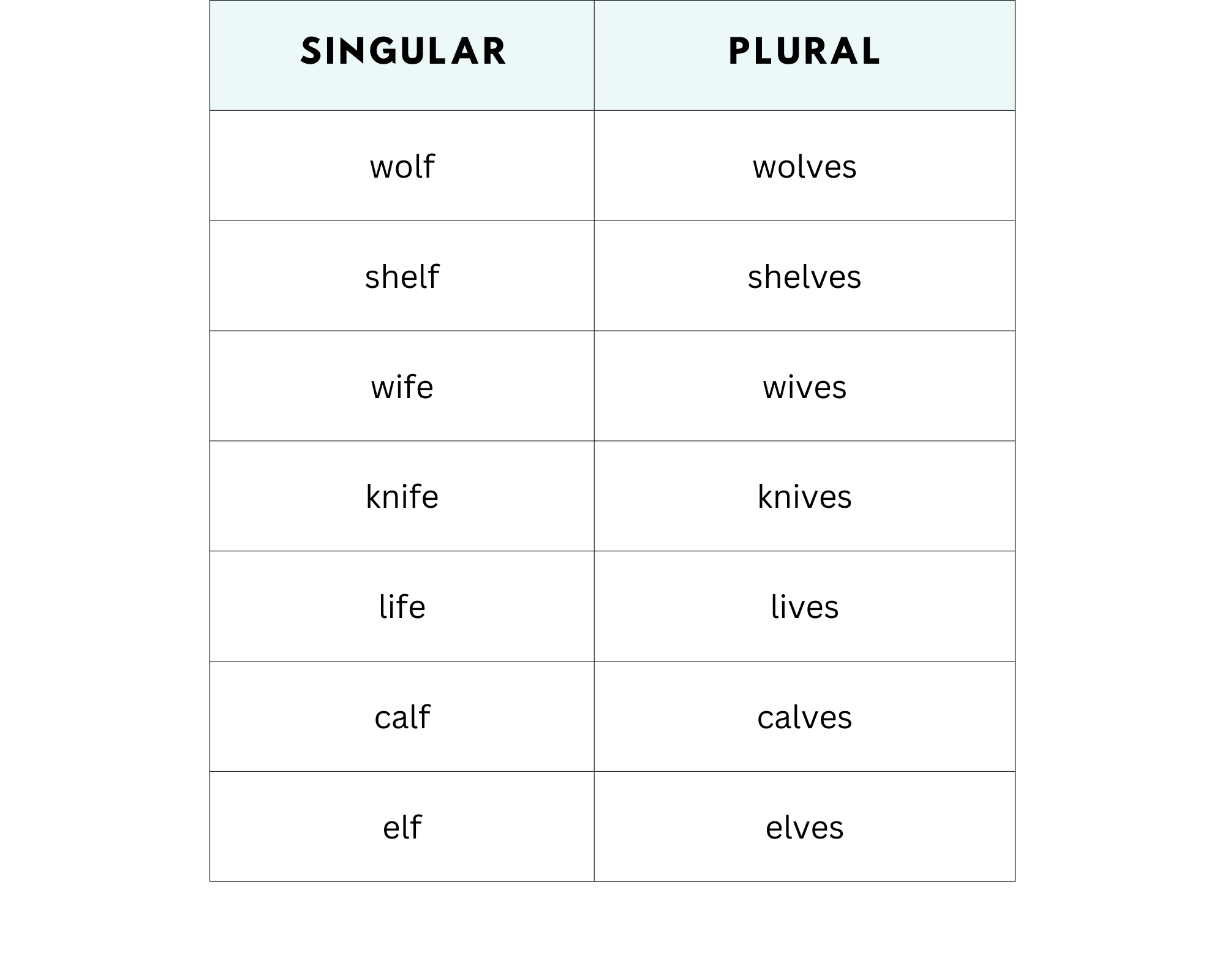
Nouns that end in f/fe and ves. Chart by Gflex on Canva.
With the irregular nouns above, they are each made plural by switching the –fe or –f to –ves. Some nouns are so irregular, they don’t even change at all when used in singular or plural contexts (animals like moose and deer remain the same in both singular and plural noun forms). Dice/die belong to irregular nouns that derive ultimately from the Germanic languages, and demonstrate the i-mutation (or i-umlaut).
In review: the plural of dice
The singular of dice is die. The plural form of dice is dice. Both dice and die are acceptable to refer to a single dice/die.
Worksheet
According to the blog post, what is the formal singular of the noun “dice”?
In Modern English, which word is often used to refer to a single game piece, according to the post?
According to the post, which word is steadily becoming antiquated when referring to a single game piece?
Which of the following sentences uses the formal singular form with the correct verb agreement, according to the post’s usage note?
Which of the following sentences uses the formal plural form with the correct verb agreement, according to the post’s usage note?
The post states the formal way to refer to a single dice is ______.
In Modern English, the word ______ is often used for both the singular and plural forms of the game piece.
Please hand me one ______. (Using the formal singular)
The post notes that using the plural noun “dice” incorrectly with a singular verb like “was” is an example of incorrect usage when referring to multiple items: “The ______ was scattered all over the floor.”
According to the post, the correct plural form of the noun “dice” is always ______.
FAQs
What is the formal singular of “dice”?
+
Can “dice” be used for a single one?
+
What is the formal plural of “die”?
+
How do you use “die” and “dice” formally?
+
Is using “dice” for singular wrong now?
+
Yash, D. "What’s the Singular of Dice?." Grammarflex, Jul 15, 2025, https://www.grammarflex.com/whats-the-singular-of-dice/.

